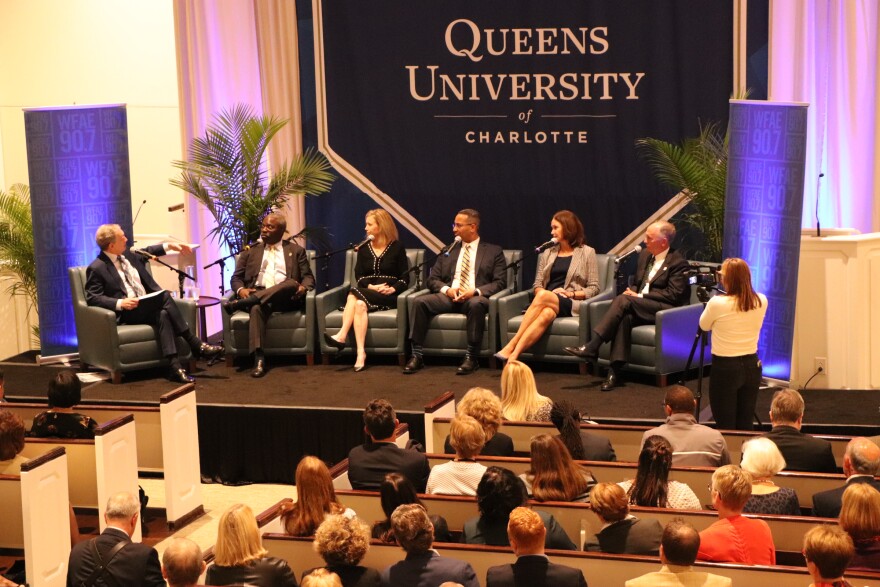Leaders of five Charlotte-area colleges and universities met at Queens University on Wednesday to talk about why higher education costs so much, how to put it in reach of more students and how to rebuild confidence in the value of a degree.
"I think that one reason we’re focused on why does it cost so much and is it worth it is that the public has lost confidence in higher education," said Davidson College President Carol Quillen.
She joined the heads of Central Piedmont Community College, Johnson C. Smith University, Queens and UNC Charlotte for a forum on higher education moderated by Charlotte Talks host Mike Collins.
All of them talked about the value of college education, not only to the individuals but to society. For instance, UNCC Chancellor Philip Dubois said college graduates earn more, are healthier, and are more likely to vote and give to charity.
Quillen cited a number of causes for a decline in public confidence, including questions about the relevance of college and lapses of integrity like the recent national admissions scandal. And she posed another question: "Are we fulfilling the mission that our country is asking us to do?" Quillen asked. "Are we educating more and more people, many non-traditional students, for the careers they want, at a lower cost, quickly?"
Davidson charges almost $68,000 a year in tuition, room and board – more than 2.5 times the cost of a year at UNCC for an in-state student living on campus. Quillen said alumni and other donors provide extensive financial aid to bring a Davidson education within reach for qualified students.

Even at state schools, costs are a challenge, Dublois said. He said when he took the job in 2005, the state covered about 80% of the cost. That plunged during the recession, he said, and even now it’s only back to 60%. That means students carry more of the burden.
But Dubois said the idea that every college graduate faces crippling debt isn’t accurate. About one-third of UNCC graduates have no debt, and for those who do graduate with debt the average is about $25,000, he said.
"Is $25,000 after a college degree a crippling amount of debt? It’s certainly a burden, but it’s not going to be a burden for someone in engineering," Dubois said. "It might be a burden for someone in education or nursing, but I think it’s still a manageable number over the long haul."
CPCC President Kandi Deitemeyer says her campuses offer a less expensive option, whether that means earning a credential for less than $10,000 or starting at a community college and finishing at a four-year school. But she also noted that online institutions can offer certificates and degrees for even less money … but with less assurance of quality.
"The marketplace of higher education has changed," Deitemeyer said. "That’s not a comfortable statement for those of us who’ve been in higher ed for a very long time."
All the leaders say it’s essential to open doors for students who struggle for financial survival. They talked about government aid, philanthropy and partnerships with businesses that need educated workers.
Queens President Daniel Lugo, who started the job July 1, said all the schools will need to work together to make the region competitive for high-tech employers like Amazon. Charlotte didn’t make the cut for its second headquarters last year. Lugo said the challenge here is common across the country: "We’re not producing enough graduates with these types of computational, analytic, technical skills that will fuel the 21st century economy."
Historically black universities have struggled with declining enrollment in recent years. Johnson C. Smith President Clarence Armbrister says that means he’s got to look beyond the traditional market.
"Our challenge is making sure that we diversify," he said. "That 18- to 24-year-old population is declining, so we need to make sure we look at adult students."
Whatever the driving forces, all five leaders stressed the importance of opening the doors to talented students from all backgrounds … something Davidson’s Quillen described as not just an ethical duty, but a move that boosts the value of education for everyone.
The full conversation is available here.




